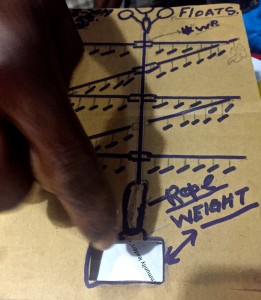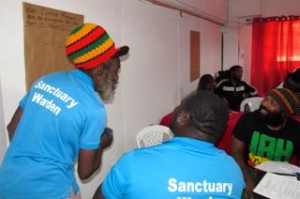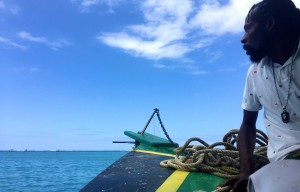
Three Things I Learned From a Boat Trip
March 31st, 2019
Sometimes life throws you into a learning curve. You have to reassess your attitudes and beliefs. I have stepped onto so many of these curves recently that I am feeling physically and mentally exhausted.
I have also been on some boat trips recently. Some have been very comfortable. The most recent one was – well, eventful. But it taught me a thing or two. I should explain that I was out in a glass-bottomed boat with a group of community activists, fish sanctuary wardens, divers, fishermen, farmers, singers, songwriters. These were the Voices for Climate Change, who are currently engaged in workshops to craft musical messages. We were on a quest to see the coral gardens, planted and nurtured in the White River Fish Sanctuary, a non-governmental organization run by the White River Fishermen Association (WRFA) and White River Marine Association (WRMA – stakeholders). We toured its boundaries, marked clearly with red and white metal posts – a total of 372 acres.
I had companions – but I succumbed to a fit of nerves. On our return to dry land, there was much to think about.

A warden at the White River Fish Sanctuary explains the arrangement of small pieces of coral in the coral garden. When the pieces have reached a certain size, they are transplanted onto the reef. (My photo)
Firstly, I learned that coral reefs protect our coastline very effectively. They are a natural barrier, better than any manmade wall or breakwater. Jamaica’s coral reefs are largely degraded and unhealthy, due to a variety of factors. With climate change, the seas are getting warmer and the “coral bleaching” phenomenon, which seems to come in waves, has done a great deal of damage. Pollution from the land is also a huge factor. Our sea suffers from the things we get up to on the land – and as most of us live on or near the coast, it’s quite easy for our more harmful activities to have an unpleasant impact on the ocean. The pollution comes from the chemicals that run off the land from farms and fields and factories; untreated or partially treated sewage from houses and hotels; and of course, solid waste (garbage), including tons of plastic, that washes down our gullies and rivers.
So how did I learn that even a weak and depleted coral reef offers protection to our eroding coastline? Simple, really. As we went out in the boat, the water was calm. A man paddled himself around, all alone, on a plastic board. We headed around the reef, and all that changed. The waves swelled and grew larger, and we dipped and lifted over them, sometimes with great difficulty. Those sitting in the bow like myself were continually splashed with spray. It was a different story – no protection here, just the open sea. And this was not a stormy day; it was cloudy at times, but hardly bad weather.

Wardens from the White River Fish Sanctuary working with artistes at the Voices for Climate Change workshop in Ocho Rios last week. (My photo)
Secondly, I realized what our fishermen have to endure when they go out in smaller boats (“canoes” as they still call them), even on an average day like this. The weather can change; the sea changes with it. With climate change, the weather is much more unpredictable, too (this we learned during the Panos Caribbean workshop). It takes some nerve to go out on the sea, in ones and twos and threes, to check fish pots or catch fish further out. Moreover, these days fishermen return with very small catches – small in terms of size and in terms of the number of fish, too. It is a difficult life and with increasingly small rewards. Jamaica’s shores are over-fished. Going further out to find better fishing grounds has its own hazards, too.
There is something else I should mention. The sea is a mighty force. It may look calm from a distance; up close can be another matter. As I gazed out to sea, I saw the horizon was jagged with waves. I realized that we humans are very small – just a speck on its surface.
Yes, I am not as brave as I thought I was. That was the third thing I learned. I realize that I should treat the ocean with respect, care – and love.
So should we all!
Learn more about the great work the White River Fish Sanctuary is doing here. You can also find them on Facebook and Instagram.
Tags: agricultural runoff, Climate Change, coastline, coral reefs, coral restoration, fishermen, land-based pollution, marine environment, overfishing, Panos Caribbean, plastics, sewage, solid waste, sustainable fisheries, training, Voices for Climate Change, White River Fish Sanctuary
The Gleaner reserves the right not to publish comments that may be deemed libelous, derogatory or indecent.
To respond to The Gleaner please use the feedback form.
2 Responses to “Three Things I Learned From a Boat Trip”
- We Are the Zoomers
- Living Online with Humans and Birds: NAOC 2020
- Human Trafficking and the Problem of Public Education
- Down Memory Lane
- Are We Ready to Recover from COVID-19?
- Road Safety Matters: Is Your Vehicle Safe?
- Sexual Harassment, Me Too, and the Minister’s Disturbing Giggle
- The Vulnerable Senior Citizens, Private Care Homes and COVID-19
- A Muddle Over Masks
- Here is Something Life-Saving You Can Do: Give Blood!




[…] of all is “hands on” and experiential – like the (somewhat hazardous) boat trip we took recently, to view the coral gardens planted by the White River Marine Association. There […]
[…] poets – have been working on some powerful lyrics this year, workshopping and going on field trips. They are taking them on the road for live concerts, Read Across Jamaica sessions and tree planting […]